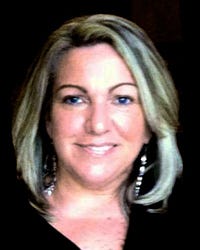Registered Nurse Lisa Guzzardi Explains New Medical Field Of Nursing Genetics
By Fallon Davis
What makes a nurse just as important as your primary doctor? Their will to work long hours, comfort ill patients and wear scrubs is part of the everyday routine but the expert experience and advice that a nurse can give you is invaluable — especially when they come in contact with hundreds of sicknesses and diseases a week.
 Registered nurse, Lisa Guzzardi has taken her career to the next level by supporting patients outside of work hours.
Registered nurse, Lisa Guzzardi has taken her career to the next level by supporting patients outside of work hours.
She started a community dedicated to her passion for breast and ovarian cancer awareness. Finding answers to these diseases has directed Lisa in a new direction of genetic mutation studies, also known as nursing genetics, a new specialty field of nursing.
Lisa Guzzardi (@LguzzardiM) is rated in the Top 100 for Mutation authority on medical sites for ovarian and gynecological cancer. Some of her support groups , #JournalClub #bcsm #gyncsm #BRCA#HBOC and #PatientAdvocate are dedicated to providing up to date evidence based research for 2.3 K ‘SoMe’ consumers at risk & clinicians.
How did you get into nursing and what do you specialize in?
I’ve been a nurse for 30 years. I am a former critical care nurse. I used to work as a cardiac surgical ICU nurse for a major hospital in Manhattan for seventeen years. Currently, I am working as a pre-op nurse and looking to get into genetics nursing.
I love genetics and I really would like to work with high-risk women. There are many startup companies and I am looking to transition my career into genetics. My biggest regret is not going to graduate school and getting my nurse practitioner. I do regret that because that would’ve opened a lot of doors for me. The new specialization of genetics and genetic counseling is exploding right now in the medical field, but there is a limited amount of nurses and counselors pursuing it.
What are the responsibilities and daily routine of a genetics nurse?
Genetic nurses would work with genetic counselors and physicians to identify patients that could be a high risk, as well as screening them to see who would benefit from genetic counseling. The nurses navigate for the patients and get them in the right direction.
In the many years working with the ill, what are some of the tactics or methods you use to help your patients cope?
Oh yes, I could write a book on that. There is a lot of resources out there for women. It’s hard to do that at the professional level in the job that I am at currently I am working in the pre-op field where patients are going into surgery, so I am kind of limited.
During my free time out of work, I help to mentor women over the years and help them make surgical decisions. I never advise them in what to do but, what I do is give them the tools that they need to make decisions.
Women at risk who are facing prophylactic surgeries prevent ovarian cancers is very difficult and very overwhelming decision to come to and to decide what to do because not every woman at risk who has a BRCA (breast cancer gene) mutation is going to get cancer so you have to look at a lot of things.
You have to look at a man’s or woman’s family history, the age of onset of these cancers and its effect on women greatly when they see their mothers, grandmothers and aunts with breast cancer at young ages.
How did you become a supporter for breast cancer?
I come from a family that has breast and ovarian cancer on both sides, so I am a woman at risk. My passion for working and mentoring women who are at risk became prevalent when I myself went through genetic counseling in 2006.
Out of my personal journey, that is how I found my passion for it and started being an advocate for women at risk for hereditary breast and ovarian cancer.
How did you get put in the top mutation authority? What is it?
A BRCA mutation is something that you’re born with. It’s passed down from a mother or a father. There is a huge misconception is that not only can you get breast cancer or ovarian cancer, but also that a BRCA mutation or any kind of family history is only relevant if it comes from your mother’s side.
Some doctors today tell women, “Oh don’t worry about it, any history from your father’s side is irrelevant,” claiming that this is true when women are being affected by this and it is the furthest thing from the truth. It’s scary and I personally know several women who have been told that story and it’s very sad.
The history on your mother’s side is equally as important as the history on your father’s side and BRCA gene mutations often get hidden on the father’s side for several reasons. The most prevalent reason is that many men who carry the BRCA gene don’t get cancer and if they do get cancer it’s either prostate cancer or pancreatic cancer.
Also, breast cancer in men is often associated with a BRCA mutation. Male Breast cancer is extremely rare and only affects about 2000 men a year. Even though it’s rare, when you see a man with breast cancer, red flags go off and prompt doctors to believe that the male may have the BRCA gene mutation.
You can either have BRCA 1 mutation or BRCA 2 mutation, one or the other.
Can you tell me about your involvement with Advocates For Breast Cancer?
Advocates for Breast Cancer is an organization I started. I’ve belonged to different advocacy groups and an active supporter for women at risk for breast cancer. I wanted to create a group where men and women who are at risk could find resources available.
What I have created is a journal club with almost 2400 members in the group. I do a very minimal screening process for approving people that would like to join the group. What make us different from other groups on Facebook offering primarily support, my group is unique in the sense that I provide information on the latest research and the latest articles while encouraging members to discuss the topics.
What also distinguishes my group from other groups is my huge panel of medical physicians, geneticist, genetic counselors, surgeons, plastic surgeons and breast surgeons. I have CEOs of genetic companies that are part of the group and who all actively participate and really make my club. They validate it and attribute a reliable source.
Is one BRCA mutation more severe than the other? Why are the difference between the two?
BRCA genes are known to be tumor suppressor genes and they actually help prevent cancer. Everybody has the BRCA gene but when people have a defect in the DNA and the gene becomes mutated, it then becomes susceptible to cancer because of the disruption in the DNA. If a woman has a BRCA gene and she has male children, they have a 50% chance of carrying that on to their children.
Besides family history or genetics, are there unique cases you have seen in women diagnosed with breast cancer? Are there other ways to get it?
Eighty percent of all breast cancer in women is sporadic and they don’t know why they get it. Genetics and hereditary cancer make up about 15%, so it’s not a lot. Most women that do get breast cancer don’t have a family history and it could be environmental.
No one knows what really causes cancer and anyone can do research after research on lifestyles and smoking but that is only a part of it. There is even information out there that says drinking bottled water can give you cancer now.
Women who smoke or drink alcohol regularly are at a high risk for breast cancer disease. Obesity is another factor that contributes to breast cancer. But then again you can turn around and say, “Look at the woman who is a runner and who’s never smoked or had alcohol a day in her life who is healthy and fit,” women like that get breast cancer too. How do you account for all the women who are doing everything right?
Why aren’t more hospitals making this the molecular breast imaging procedure the first option opposed to a mammogram? Do you think it will improve early detection?
Many women have dense breast tissue. When you have dense breast tissue it puts you at a higher risk for breast cancer. When you look at a woman’s mammogram, and she has very dense breast tissue, it’s slightly white. Therefore, it is very difficult to see abnormalities that may arise in the breast.
When you look at their mammogram it’s like looking for a polar bear in a blizzard. I’m not an authority on this but I can say for certain that any woman with dense breasts should also be getting an ultrasound.
Mammograms miss thirty-five percent of all breast cancers. They are considered the gold standard but if a woman has dense breast tissue, she needs supplemental imaging along with the mammogram. The number one recommended breast cancer test is a breast ultrasound.
Unfortunately, not all women know they have dense breast tissue. Unless you’re in a medical background, you are not going to know about dense breast tissue. There are states now that mandate that women be notified of their breast density.
The leading authority on breast cancer laws, who led a crusade across the country and is convincing state after state to pass breast density laws is Dr. Nancy Campello. She is an amazing woman and has saved many lives. Nancy was diagnosed with late stage breast cancer two months after having a mammogram.
Do you recommend using an ultrasound over a mammogram?
No. For women that have dense breast tissue, they should also get an ultrasound along with a mammogram. Doctors should use combined imaging, not for all women but women that are at risks. The laws are changing slowly state by state and are getting passed along. Women are becoming smarter, advocating for themselves and demanding ultrasounds along with their mammogram if they know they have dense breasts.

